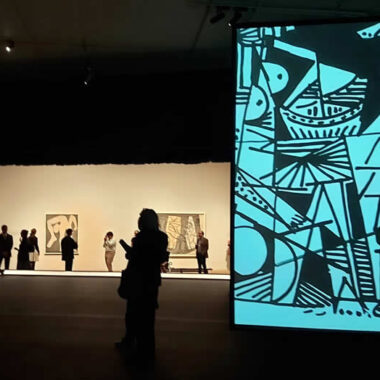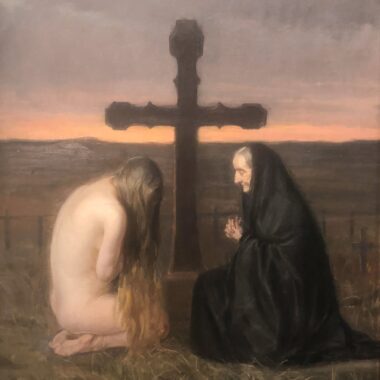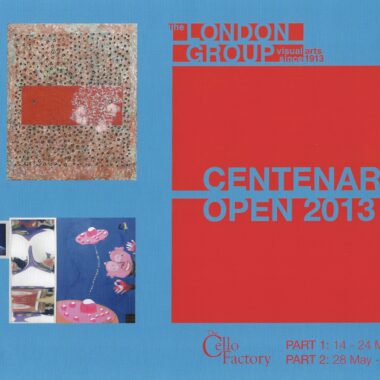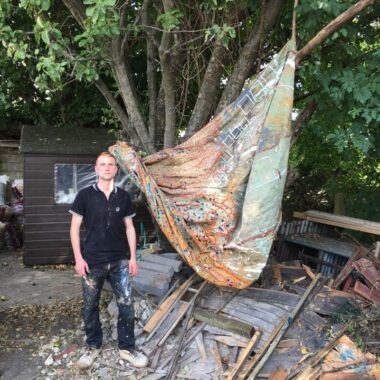A stage dive into the music in our members’ lives.
 Click on the links to play
Click on the links to play
Erika Winstone
I am not a musician but music and sound are integral to my practice as an artist. I often draw from and make videos and the sound can be as important as the visuals to me. My father Eric Winstone was a big band leader and composer and although I lived with him only until I was two, I must have heard him composing on the grand piano at home.
These days and especially during the pandemic, I turn music on immediately when I awake as it helps remind me of what is important and to connect to this for the day.
 Erika Winstone : La Duree Bridge
Erika Winstone : La Duree Bridge
 Eric Winstone and His Swing Quintette (1943)
Eric Winstone and His Swing Quintette (1943)
Jockel Liess
The more working with sound and music became part of my artistic practice, the less I found myself listening to music.
But is that true?
Music is a fundamental integral part of my life.
Or is it music?
Or is it listening?
Or is there no difference?
John Cage famously declared: ‘Every sound is music.’
He also said: ‘Until I die there will be sounds. And they will continue following my death.’
I listen all the time, to everything, indiscriminately. It is not possible for me anymore not to do so.
Does that mean my life is filled with music?
 [/lgc_column]
[/lgc_column]
 Pauline Oliveros – The Beauty Of Sorrow
Pauline Oliveros – The Beauty Of Sorrow
Julie Held
I listen to radio 3 a lot in my studio as I find deciding what to play takes up too much headspace when working. I do however, tell Alexa to play Bach or when I want to hear architectural music as this helps my think of structure . I can’t become too emotionally involved in the music as this is distracting and I stop to listen. I especially love “Ich Habe Genug“ by Bach.
When I’m clearing up I sometimes play Joni Mitchell’s ”Court and Spark“, an album in which I find optimism (necessary when leaving the studio often and doubting the day’s work !)
 J.S. Bach, Ich habe genug, Fischer-Dieskau
J.S. Bach, Ich habe genug, Fischer-Dieskau
Victoria Arney
Watching Waiting Listening
Music has always played a large part in my life, while researching my birdsong work I came across a wonderful passage by Tim Dee ( The running Sky ) who likened his experience of being in a swirling flock of starlings to Thomas Tallis SPEM IN ALIUM and continuing my research I have realised that sound is integral to understanding the ebb and flow of landscapes we think we know. We are visual beings and make our assumptions visually about how the world works but this comes at a cost we only get half the story, music helps fill in those gaps.

 Tallis – Spem in alium (a 40) – Harry Christophers
Tallis – Spem in alium (a 40) – Harry Christophers
Robert Coward
I think that it was the abstract painter, John Hoyland, who first gave me the title “The Rock and Roll Accountant”. In 1973 I bought my first pair of jeans, wearing a granddad collarless shirt and Converse All Star baseball boots. I had swapped my LP of Tchaikovsky’s First Piano Concerto, replacing it with CDs of the Rolling Stones, the Kinks, Bob Dylan, Eric Clapton, Tina Turner and Santana and moving on to Culture Club, Roxy Music, David Bowie, Allman Brothers, and Tom Petty, and finally my “progressive period” of Pink Floyd, Yes, Talking Heads, Blondie, and Tangerine Dream. I amassed a collection of some 1,000 jazz CDs, from John Abercrombie to Joe Zawinul.
I had also picked up an interest in World music, particularly the Greek rebetika singer, George Dalaras. My music has been my saving grace from accountancy.
I think that my favourite tracks would be Miles Davis, Kind of blue; Rolling Stones, Street Fighting Man and George Dalaras, Didymotiko; Blues.
 [/lgc_column]
[/lgc_column]
 George Dalaras, Didymotiko Blues
George Dalaras, Didymotiko Blues
Suzan Swale
I love all kinds of music from rock to jazz.
Looking through my CDs in the studio is a revelation in itself. Coldplay, Bruce Springsteen, Jeff Buckley, Charlotte Gainsbourg, Muse, George Michael, Kasabian, Radiohead, Bob Dylan, George Dalaras and so on…
I tend towards liking rock anthems and a fair amount of Jazz.
I love Snow Patrol, especially Chasing Cars.
This was played for me by a hospital disc jockey after a serious operation. I also love Amy Winehouse. Especially:

 Back to Black by Amy Winehouse
Back to Black by Amy Winehouse
Paul Tecklenberg
The music I listen to has changed over time, not because of taste but the purpose it has. For instance, I went through a phase of making large black & white photograms which meant rolling several meters of photographic paper in developer, stop and fixing troughs. I would use the short, snappy tunes of the Pixies ‘Doolittle’ album to time how long the photographic paper had been developing for. Working in a darkroom under ‘red light’ can induce an altered state and listening to Steve Reich’s ‘Music for 18 Musicians’ further induces that state of mind that allows me to flow.

 Music for 18 Musicians, by Steve Reich
Music for 18 Musicians, by Steve Reich
Sławomir Blatton
 My music is called EQUINOX by John Coltrane
My music is called EQUINOX by John Coltrane
Tim Pickup / Genetic Moo
“…music is the best” Frank Zappa
God! if only I didn’t spend all my time making digital art, I could make music instead.
I’m not listening to anything at the moment, I find my music consumption has gone in waves over the years – I used to have hundreds of Soul records, Motown, Stax, the sound of Philadelphia! – but then got rid of all my records, and got into P-Funk, Mingus and Zappa on CDs. Then I got rid of all my CDs including about 60 Zappa joints, and now everything is available to stream online, I find myself listening to nothing. Still waiting for the musical genius of the 21st century to make their tech swing. If only there was more time…

 Frank Zappa – Don’t You Ever wash that thing
Frank Zappa – Don’t You Ever wash that thing
Gill Ingham
Music has always been an important part of my life. My love of early music developed as a student. My room was very small but I could fit a clavichord (Bach’s favourite instrument) in. It is a very quiet instrument and didn’t upset the other students. I really enjoy playing ensemble music with friends who play recorders, flutes, cellos, viols, etc. This social activity is a really good balance to painting alone in the studio. Music I like to hear in the studio tends to be either Bach Cantata’s of which there are 1,127 recorded or Telemann’s trio sonatas. But any Baroque: Couperin and Rameau from France, Blow and Purcell England, Frescobaldi Italy, Scarlatti with the Spanish touch, Froberger and all the Bach family in Germany will do. Difficult to say how music influences my painting, I suspect it is more unconscious than conscious. Titles of my paintings often have musical connotations where they share an evocative emotion or feeling.[/lgc_column]

 Pawel Siwczak playing Duphly’s Médée
Pawel Siwczak playing Duphly’s Médée
David Redfern
After the attraction of Radio 3 begins to fade late in the afternoon I turn to my small stack of favourite CDs, Velvet Underground, Shostakovich, Vaughan Williams and Mike Liggins. Mike has been making and recording music for many years and has produced a large amount during lockdown he tells me. Mike (our previous mega-Hon. Sec. for newer members) gave me a copy of his “Ritual Landscape” with an image of Stonehenge on the cover, a visual equivalent of the spiritual eeriness of the contemplative music inside. It soothes my troubled brow. Right at the end of a frustrating and fruitless day I quite often listen to another CD Mike gave me, an audiobook, “The Book of Disquiet” by Fernando Pessoa. This pessimistic/optimistic account of the futility of life paradoxically has an ability to restore my perspective on the life of a ponderer.

 The Velvet Underground – Sister Ray
The Velvet Underground – Sister Ray
Chris Horner
I always have the radio on in my studio when I work. More often than not I like to play my ‘best of Bowie’ CD. I always start the CD by skipping to track 04 on CD 1. The song titled; Changes then blasts out of the speakers.
I love all of David Bowie’s music, ranging from a song like; Space Oddity, 1969 to Lazarus, 2016, which sadly was a song of his final album; Blackstar, 2016.
However, his song Changes always makes me think about my work, especially when I listen to the first couple of lyrics from the song. I still don’t know what I was looking for. And my time was running wild.
 [/lgc_column]
[/lgc_column]
Michael Phillipson
…aaaaah(in B flat)…music…unboundaried non-zone where, via noises-sounds, this ‘otherwise’ (to every spaced placed ‘there’) dissolves seeing’s home comforts into an unseeable else-time…gone-in-the-air…whose every performance times itself off-and-away as it searches for its own (always fading) extremity…a celebratory intense melan-cholia spine-tinglingly excising us from sight’s grasp… sweeping us into the pitch-black-and-blue of the Queen of the Night’s stratospheric no-place…blinding us to every place as it exstreams away…a becoming-blind unavoidably brought home to us by blind musicians themselves…perhaps we can only watch-listen in astonishment as, together, breathing touching they improvise themselves into resonating time with nothing but itself…Roland Kirk and Tete Montoliu in concert long ago…experienceable still on YouTube…definitively not background music for any studio-practice…

 Roland Kirk with Tete Montoliu – A Cabin in the Sky
Roland Kirk with Tete Montoliu – A Cabin in the Sky
James Faure Walker
Enjoying music is now more difficult because of hearing loss, and it’s a distraction while working. Luckily, I can manage on the piano. That’s how I listen. I play most days, to relax, an enthusiastic amateur – Haydn Sonatas, Chopin, Liszt. My favourite piece is Schumann’s ‘Des Abends’ (Evening). I heard Stephen Hough play it as an encore, serenely floating out on the ether, sounding effortless … that’s what I aim for in painting. Otherwise, my top ten would include Verdi’s Don Carlos, Berlioz’s Trojans, Bach’s organ chorales, Bartok, anything from Tommy Dorsey, Miles Davis, Mingus, plus Peggy Lee.
 Brendel plays Schumann Fantasiestücke, Op.12 – 1. Des Abends
Brendel plays Schumann Fantasiestücke, Op.12 – 1. Des Abends
Amanda Loomes
In 2017 I collaborated with artist Alison Carlier and the arts organisation Metal on an audio artwork for the rose garden in Chalkwell Park, Southend. A retired park gardener inspired the title and concept for the artwork – he grew up a punk and imagined naming a rose ‘Spiky Black’ in memory of his Mohican hair. This led us to New Rose by The Damned. The drumbeat perfectly matched the sound of machines shaking soil from the roots of rose bushes and the hard graft in the commercial rose fields of Norfolk.
More information about the project and the audio artwork can be heard at www.netpark.zone/artist-projects/spikyblack

Micheál O’Connell / MOCKSIM
The idea of escapism in art concerns me. Whilst I’ll listen to a wide range of material, anything from Bach’s Goldberg Variations to Robert Wyatt’s songs, or the output of bands like Fontaines D.C., at one point I’d get fired up by bands specifically from Zimbabwe, in more recent history a duo called No Bra, the infamous DJ Scotch Egg, and later still a performer called Sneaks and another I came across a few weeks ago, Tony Njoku, my choices are generally either the result of having experienced music in a live context or they are something I completely distrust. I enjoy the sounds of a washing machine or dishwasher going through its cycle. In terms of a seriously influential, work, I’d pick Arseny Avraamov’s Symphony Of Factory Sirens, though it’s hard to imagine what that was like, live in Baku, in 1922:
 Arseny Avraamov – Symphony Of Factory Sirens (Public Event, Baku 1922)
Arseny Avraamov – Symphony Of Factory Sirens (Public Event, Baku 1922)
Nicola Schauerman / Genetic Moo
A favourite music-to-work-to search phrase of mine is “original motion picture soundrack”. Interesting things are happening in contemporary film music. For me, this is where it started: Bernard Herrmann
 Bernard Herrmann – Vertigo (theme)
Bernard Herrmann – Vertigo (theme)
Alexandra Harley
Morris tunes. Whilst Radio 4 is generally staple listening I find that I want to listen to what is being said and not miss anything. This becomes a tad tricky when I need to make a noise and /or get on with making. R3 is great but when I am working at home, drawing or polishing stone, quiet making, I often listen to traditional English music and I love Morris dance tunes, and the sound of exuberant performers -often friends- having fun.
 1929 Morris Dancing in New York State
1929 Morris Dancing in New York State
Susan Wilson
I go to the opera often, I always have. I started locking my bike up outside the ENO when I was a student at Camberwell and getting a balcony seat to whatever was on. Then, I discovered the Upper Slips at the Royal Opera House, and as a postgrad at The Royal Academy Schools went often. It’s been my inspiration, comfort, respite, a source of light, colour and ingenuity. The Venetian painters worked in opera houses and theatre, painting flats for the stage. Canaletto’s father was one. Piranesi studied the stage first, and his prints and drawings are theatrical. He makes up stagings. In my studio, I love to play radio 3, composer of the week, an opera relay, or a prom.

Ian Parker
Sometimes when I work I listen to music, sometimes I don’t. There is no particular reason to do so or not to do so. Recently I’ve listened to a lot of Max Richter, William Basinski and GoGo Penguin.
 Max Richter – Memoryhouse (2002)
Max Richter – Memoryhouse (2002)
Paul Bonomini
I love music of all genres, although I generally listen to classical (especially opera) or Jazz. Wagner, Verdi, the raw power of Shostakovitch’s Lady Macbeth of Mtsensk. For me it’s the energy of the music, the rhythm that I physically feel, that I draw on. The image is of a piece previously titled “And…..Breathe!” which I am currently re-imagining as an interactive sound sculpture called “Rhapsody in Blue”, after Gershwin’s piece. The twisting blue pipes brought the opening clarinet glissando to mind, so playful and perfect to whistle along to.

 George Gershwin – Rhapsody in Blue
George Gershwin – Rhapsody in Blue
Victoria Rance
Music is an integral part of my work. I started making stop-frame animations in 2010 as a way of recording interactions with my Sculpture to Wear series. My oldest son Jethro Pemberton was studying electronic music composition at The Guildhall and wrote the music for the first animations including “Medusa and Perseus” https://vimeo.com/162519560.
I also worked with Canadian composer Lynn Yang on two projects in 2014 (https://vimeo.com/163069643) and 2017. My youngest son Cole began writing music and making films. During lockdown collaboration with him was natural. He wrote the music for the Fisherdottir series and another is in progress now.

 The Adventures of Fisherdottir music by Cole Pemberton
The Adventures of Fisherdottir music by Cole Pemberton
Charlotte C Mortensson
Music is all around me when I work in Jamaica, coming from homes, shops, bars. It’s all-encompassing.
My art practice in Jamaica is largely documentary and the music in my videos is always ambient. I don’t alter what was there, because it is part of the whole picture.
Music is probably the most powerful art form in Jamaica. There is a long tradition of reggae and dancehall artists – Sizzla, Chronixx, Buju Banton – highlighting social injustice, corruption, poverty, and also everyday lives and joys. They speak for the disenfranchised who have little or no voice or power.
 Charlotte C Mortensson : Lion Order
Charlotte C Mortensson : Lion Order
Sumi Perera
TURN THE PAGE…An artistbook installation (tribute to my pianist mother) explores the percussive interruption by the ‘page turn’ in reading music.
Accompanied by an audio-recording of only the page turn of the music manuscript (Beethoven’s Sonata in C-The Pathetique) while the actual playing is mimed in real-time.
Originally designed for ‘Book to Book’ exhibition, Leeds Art Gallery in 2008.
Also shown at:
– FLUXUS-POST-FLUXUS The The Art Space, Nicosia, Cyprus. 2010 & Dusseldorf. 2011
-TURN THE PAGE Artistbook Fair THE FORUM Norwich 2011
– PLAY at London Print Studio 2014
– IMPACT 10–International Conference on Printmaking, Santander, Spain 2018
 [/lgc_column]
[/lgc_column]
 Beethoven Sonata No. 8 in C minor Op. 13 “Pathétique”
Beethoven Sonata No. 8 in C minor Op. 13 “Pathétique”
Stephen Carley
This is an interesting one. Even though I make ‘music’ as a significant part of my studio practise, I really can’t work with music playing if I’m painting, drawing or working in the darkroom. I struggle to divorce myself from the melody, the rhythm, the lyrics… But, I do need sound whilst I work. This is provided by 1. The sound of neighbouring gardens – children playing, dogs barking, adults arguing. 2. The workshop below my studio, which is a constant set of ‘little mester’ workshop sounds. 3. The radio playing either (a) football commentary or (b) current affairs stuff – though its an analogue machine so the reception is a little distorted. 4. General ambient sounds (aeroplanes, distant trains, fireworks).
Saying all this though, music is integral to my being / wellbeing. I have a huge personal collection of records, CD’s and cassette tapes. Listening to music is a thing in itself. I find I have to give it my total focus. What music inspires me? To distill that down to one item is difficult but I would say an LP called ‘F♯ A♯ ∞’ by Canadian post rock collective ‘Godspeed You! Black Emperor’.
Expansive, ambient and intense. And here it is:

Clive Burton

The Most Dissonant Interval (flat minor 9th)
improvising sound
colour shape form
harmonised dissonance
sublime abstraction
dada – da – da
start between the lines
deviate without diffidence
lost in serendipity
control uncontrolled
dada – da – da
find the way home
the art is the journey
leaving it’s truth
dada – da – da
mingus renegade
wednesday night prayer meeting
pollock convergence
colour to hear
sound to see
dada – da – da
harmonies of dissonant forms
colour of tones
steely dan
dada – da – da
journey in space time
structure less form
screaming headless torsos
pheromones for tots
spiritual intercourse
goodbye mr porkpie hat
dada – da – da
aja
amalgamising dangerous jazz
the deacon blues
faking the artifice
endorsing the enlightenment
truthfulness of the soul .
Clive Burton ‘21







